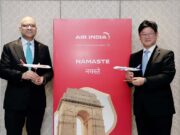Nine months into operations, Akasa Air, the new entrant in the Indian civil aviation sector, has already grabbed a five per cent market share, while adding a record 19 aircraft to its fleet and reaching out to 16 destinations in the country. The airline recently announced an order for four additional Boeing 737-8 jets at the recent Paris Air Show, a follow-up to the already placed order of 72 aircraft taking it to a total of 76 aircraft. For a start-up airline, this indeed is a towering achievement within a short time. To gain more insight, TTJ interacts with Praveen Iyer, Co-Founder, and Chief Commercial Officer, and Belson Coutinho, Co-Founder and Chief Marketing and Experience Officer, as they keenly share their viewpoints and some dynamics of India’s newest airline.
– Prashant Nayak
India’s aviation sector is witnessing monumental expansion, with airports and airlines adding capacity amidst surging traffic post-pandemic. India is fortifying to handle over 1.3 billion passengers annually in the next 20 years. There are currently 148 airports in the country, and it is the third-largest domestic market in the world in terms of seat capacity. This is indeed an exciting phase that the aviation industry in India is witnessing post-pandemic era.
Commenting on the same, Praveen says, “The fact that India’s aviation industry has unbridled growth potential is exhilarating. The rising growth of India’s middle-class segment, infrastructure development and a supportive policy framework has given a commendable boost to the aviation sector. Since December 2022, the industry has been consistently witnessing over 4 lacs passengers daily, indicating that the demand for air travel is bouncing back with a strong force. The environment is ripe and perfect for airlines to utilise the increasing travel demand and chart out their next phase of growth.”
Adding to the enthusiasm, Praveen reiterates that the Indian aviation market has ample space for multiple airlines to thrive. “Absolutely,” he remarks. “We are one of the most populous countries in the world and yet relatively underserved in terms of airline capacity. According to MOCA’s projection, India is projected to have 40 crore air travellers on domestic and international routes by 2027 and will breach the 50 crore mark by 2030. We need multiple, well-run airlines to fulfil this swell in demand. The Indian aviation sector is extremely promising, with a bright future with unlimited potential ahead and the market is large enough for many carriers to profitably participate,” adds Praveen.
Airlines are up against multiple challenges when it comes to growth. The competition in the airline industry today has also turned highly intense. “Every industry is presented with its own set of challenges and aviation is no exception. One of the main challenges in the industry is the high value-added tax (VAT) on aviation turbine fuel (ATF) where fuel being a major cost component. This adds a lot of financial overhead to an airline. However, measures taken by the Ministry of Civil Aviation in this regard have been commendable. The reduced ATF tax rates in some states as an outcome of the ministry’s ongoing initiatives have greatly assisted airlines in controlling a number of costs,” mentions Praveen.
On being asked if the carrier is living up to the customers’ expectations, Belson responds, “Akasa Air has been instrumental in redefining the representation of an Indian airline. We have taken decisions that have been category-defining in many ways. Our vision behind Akasa Air was to create an airline that is dependable and that everybody can relate to. Since its inception, Akasa Air has instituted multiple industry-leading, customer-friendly products, and services to provide travellers with an inclusive, warm, comfortable, and efficient flying experience. We continue to leverage consumer technology and our recent features of automated gate number and baggage belt number notifications on mobile, bear testimony to our commitment, extending a seamless experience to our customers.”
Belson further adds, “Our empathy-driven culture, the scrumptious food of Café Akasa, our distinctive in-flight music, USB ports, softer seat cushions and spacious legroom all ensure a customer experience that is second to none. We are now escalating this experience to a whole new level with our add-on services with the use of select your seat, priority check-in, and board first, for a smoother journey. Flyers can ease travel with our branded fares, car rentals, hotel bookings and Akasa VIP experience, all offered as part of our continued commitment to their convenience.”
Akasa Air is also focused on being an inclusive airline, introducing its ‘Pets on Akasa’ policy to enable pet parents to travel with their fur babies. An in-flight safety manual has been established in Braille for the visually impaired. “Impact of our policies is reflected well in our consistently increasing passenger load and we are excited about our growth chart,” remarks Belson.
Attending to and resolving grievances of customers and travel partners, one of their most important customer links is the round-the-clock Akasa Care Centre. Belson elaborates, “Our Care Officers are always available and equipped to provide support for voice, email, and social media queries. Customer feedback, coupled with our world-class listening and response management system, helps us constantly enhance and optimise customer experience. We address consumer complaints constructively and take their feedback into consideration for the improvement of our products and services.”
Customer centricity backed by empathy-driven communication being the core marketing strategy, they connect and engage with first-time travellers as importantly and diligently as with frequent flyers. “Our marketing campaigns are designed to communicate the airline’s commitment towards creating a warm, dependable, and affordable air travel experience that creates an inclusive environment for all. Furthermore, our focus is to deliver personalised and local content as we expand our services across the length and breadth of the country,” assures Belson.
Discussing the airline’s growth strategy in terms of domestic or international operations, Praveen believes that as part of their dedication to serving the country and its citizens, they are improving accessibility to air travel by establishing a strong national presence and providing linkages from metros to tier 2 and tier 3 cities across the country. “Our phased approach to support our network plans progressively connecting more cities, allows us to provide continuously reliable and efficient connections between sectors,” says Praveen.
Akasa is currently operating to 16 destinations across the country- Mumbai, Ahmedabad, Bengaluru, Chennai, Kochi, Delhi, Guwahati, Agartala, Pune, Lucknow, Goa, Hyderabad, Varanasi, Bagdogra, Bhubaneswar, and Kolkata. Adding more, Praveen informs, “To fulfil our commitment of progressively adding more cities to our route offerings, we are delighted to augment our network and are hopeful of commencing our international operations by the end of this year. We have the fastest-growing fleet for a new airline. Having inducted 19 aircraft to date, we are looking to take delivery of our 20th aircraft soon, which will empower us to fly internationally by year-end. By the end of FY24, we aim to have 25-30 aircraft in our fleet.”
Moving ahead, Belson highlights two pivotal focus areas of Akasa Air – a sustainable way forward for the industry and hiring the right talent to help propel their growth journey. He elaborates, “Awareness of climate change and its impact is of major consideration amongst people today. This behavioural change reflects in their travel patterns, with travellers increasingly choosing environment-friendly options. With sustainability being the core of Akasa Air’s values, we take special pride in proclaiming to be the greenest, most environmentally progressive airline. Our commitment is reflected across the use of aircraft, products, and services, in-flight, on-ground, office premises and our engagement with partners. Some of these initiatives include fuel-efficient engines, sustainably curated crew uniforms, and eco-friendly inflight meal packaging. A key decision taken by the airline has been to move away from the ceremonial water cannon salutes at flight and route inaugurations to manage water wastage, which has resulted in saving approximately 3,00,000 litres of water to date. We shall continue to introduce many more such initiatives as we stride along in our mission to be the most environmentally progressive airline.”
The right talent pool is indeed the backbone of an airline. Aviation is a dynamic industry, and every airline needs a workforce that is equipped to meet the challenges of the industry. “In our endeavour to create a future-ready workforce, we established Akasa Air Learning Academy to enhance the airline’s capabilities in providing hands-on and experiential training to its fast-growing employee base including pilots, cabin crew, engineers and airport services, and security personnel. We have kept an immense focus on our employee training to uphold the values of Akasa Air and fulfil our promise of being a warm and dependable airline. We are positive that this investment will be beneficial in attracting current and future talent to Akasa Air,” concludes Belson.
















































